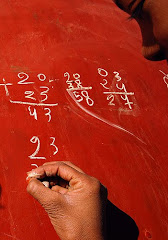Just kidding!Girls, Boys and Learning Styles
Let me start by saying I can 't believe how out of touch I was with this issue (gender differences/inequity), I hadn't heard much about it of late and thought we'd moved past this, (if I thought I about it at all that is.) boy was I wrong. This was such an interesting chapter, I couldn't help but think about the whole "Men are from Mars, and Women are from Venus" thing. The differences in gender are striking in many ways! However, it is so important to come to understand why this is so in mathematics, understanding it can help us change it. I can't personally see how males are able to put aside understanding for the sake of what amounts to competitiveness" relative performance", but then they are from Mars after all!
I was glad to read that "In England, girls now attain the same proportion of the top grades in the GCSE ... as boys,and stereotyped attitudes about the irrelevance of mathematics for girls are largely disappearing." (p.137-138). The news about the top 5% of highest attaining students being largely male wasn't as encouraging, and was frankly sort of disappointing. Women valuing "connected knowing characterized by intuition,creativity and experience" is meaningful, I think. Still females do not rise to the highest levels of achievement in the same numbers as males,one has to ask what is about mathematics that causes this? Becker (1995) makes the suggestion that "girls have traditionally been denied access to success in mathematics because they tend to be connected knowers and traditional models of mathematics teaching have encouraged separate ways of working." this resonates with me, I believe Becker may be on to something here. Girls certainly seem to be at a disadvantage.
Take Amber Hill girls for example, they having been taught with the traditional approach to mathematics instruction and Boaler found that 11 out of 15 of the underachievers were females. With boys being more comfortable, playing the game, willing "..to abandon their desire for understanding and race through questions at a high speed", those (boys) from Amber Hill are at less of a disadvantage then the girls due to the differences identified. In a school where students of mathematics are operating at a disadvantage due to instructional style and speed of instruction this added layer is patently unfair to the girls.
It is disconcerting to read that the Amber Hill girls achieved less than cohorts from Phoenix Park. Think about your daughter going to this school once having been a high achiever in math and watch as her grades slip. Boaler indicates that this was the case at Amber Hill, in the group of 11 of 15 underachievers. She specifically points out that two of the girls "Carly and Lorna" attained the highest and second highest grades on the NFER respectively; then they both came out at the lowest in GCSE! To add insult to injury the 'attribution theory" findings and suggestions tend to "blame the victim". Thankfully Boaler makes the point that the girls themselves attribute their difficulties in mathematics with outside forces and not with themselves, belying attribution theory claims. Still I believe Boaler is correct when she says that "it is important not to lay the blame for their [girls] disaffection on mathematics per se because the fault lies not with the intrinsic nature of mathematics, but with school mathematics as it is commonly constructed" Gender equity in mathematics is certainly a critical issue and one that I will be paying closer attention to in the future!



